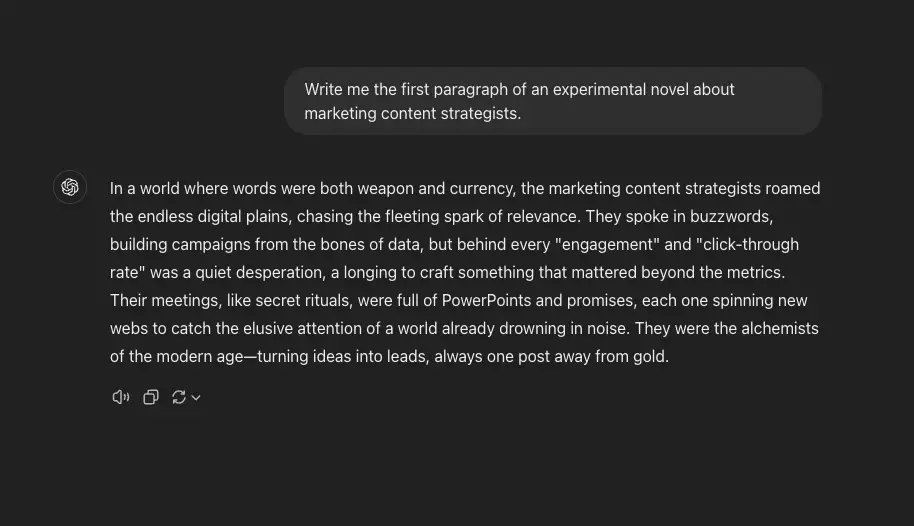Thought leadership should be fun, fast, and fearless. You tap into excitement about new ideas and advocate for something better. That’s the mindset behind The Idea Sled. Projects glide forward gracefully. It’s the momentum of commitment. This newsletter shows you how.
Generative AI is already disrupting written and spoken communication. How did we get here, and where are we going? Here are a few historical vignettes and future scenarios to map it out.
AI Past: Tell Me How to Write
AI has predecessors in the long history of rhetoric (the art of persuasion), stylistics, and grammar. The statistical mechanisms of AI presume that language follows patterns and rules. While that belief seems self-evident, humans had to invent and perpetuate it first. The idea that language follows norms has haunted humanity for millennia.
The Long View
In roughly the 5th century BCE, Indian, Chinese, and Greek cultures began to take up the notion that writing and communication can follow patterns and rules. Given the highly patterned and formulaic styles of epic poetry in classical Indian languages and Greek, the idea most likely predates the first written evidence.
By around 400 BCE, ideas of rhetoric, grammar, and style became increasingly codified in manuals. Aristotle and Panini stand out. They became a part of the curriculum for educated speakers and writers. In Greece, teachers of rhetoric offered promises to train people in rhetorical skills to help them succeed in public life. It became an industry.
(No, really, I will get to AI from here.)
In the West, rhetorical theory continues in an unbroken thread from Greece to Rome through the Middle Ages, the Renaissance, and every phase of modern Western culture. It evolved continuously throughout the major periods of Indian history as well. Chinese rhetorical theory emerged in the wake of Confucius. Post-Quranic civilization also shows a long tradition of theories and prescriptive statements about language, style, and persuasion.
Jump Cut to the 2010s
There’s no way that I can do justice to the history of rhetoric and the evolution of linguistics in a newsletter. Let’s move ahead to another critical moment in the prehistory of AI.
In 2009, Facebook introduced algorithms to its user feed. Instead of seeing posts chronologically, Facebook began to display content based on criteria of anticipated relevance and value, fed by user engagement, with the explicit goal of keeping users on the platform as long as possible. In a sense, algorithms predict what people want to see using increasingly sophisticated machine learning.
(The part about AI is still coming…)
People didn’t take long to figure out how to game the system and maximize engagement. That shift created an industry of people providing tips, selling frameworks and formulas, providing playbooks, and otherwise commercializing the desire to rise to the top of the feed, to get attention, to make money, or both.
SEO is another thread where a platform’s choices for sorting the user experience created an industry of “experts” with more or less legitimate advice to offer and sell.
Experts hawking these tools and methods with prescriptions on how to write for likes continue to be the loudest voices on LinkedIn (in my experience—I’ve left all the other platforms behind). They continue to perform well on such platforms precisely because they continue to preach the gospel of prosperity, provided you keep scrolling and posting.
Not coincidentally, the visibility of their activity also creates the illusion that THEIR formulas and frameworks create success.
The Content Industry
What I am arguing is that the content industry is complicit in a possible future where writing doesn’t make any sense and stops having anything to do with human communication or interpersonal connection. We did this to ourselves!
We now live in a world where the dominant modes of writing and communication come from what I call the content-industrial complex. You can think of them as the experts with many opinions about exactly what and how you’re supposed to write to get engagement—promises of success sold to the aspiring, just like at rhetoric’s early history in Greece. It’s a degraded, bargain-basement mentality that recycles ideas about persuasion and style in the cheapest possible way. They are the Shein and Temu of language.
The irony is that many of these content people are the same people bemoaning their imminent replacement by generative AI (finally!). The rest are those embracing AI to make “content” as rote and formulaic as possible.
It takes content being predictable for generative AI to be able to predict the next possible word in formulating a response to a prompt. AI models use complex statistical methods to guess the next probable word based on massive numbers of parameters (sometimes many billion) pulled from existing text.
Predicting the next word in a written article or social media post is, therefore, much easier than in an experimental novel or a piece offering sophisticated and novel insights.

So We’re All Getting Replaced?
I’m not sure that generative AI will replace writers in a linear, like-for-like way. Instead, there are several possible stages or scenarios, some already coming into play and others still over the horizon.
The Short-Term Economic Decision Scenario
Some business leaders will simply decide that generated content is “good enough” for the value they associate with writing. It won’t matter whether the writing is “better.” The tradeoff between cheap goods at low cost and higher quality will outweigh the perceived value of anything else.
Certain businesses will be happy to churn out content for as long as there are readers to take the bait. It’s already starting. It will take a while, if ever, for the pendulum to swing back as leadership and preferences change.
The Medium-Term Luxury Scenario
High volumes of consumable content will look like fast food. But there remains room in the market for people who can afford to provide or consume an ultra-premium experience. The nearest McDonalds is only about a mile away from Noma, frequently ranked as the best restaurant in the world.
My hunch is that industries like institutional finance, where decision makers put billions or trillions of dollars on the line when they make buying decisions, will remain on the luxury island longer than most. As long as decision makers need sophisticated insight to inform their decisions, human-authored points of view will have value.
The Long-Term AI Agent Scenario
At least in marketing, words are used to impact a buying decision made by a human. Other humans have written words to maximize that impact. But what happens when humans don’t make the decisions at all, at least not alone?
This scenario may take much longer to achieve, but theoretically, an AI agent could make a more objective and fact-based buying decision than a persuadable human. Imagine a technology product supporting investment operations, for example. Given enough parameters, an AI could determine whether a product is technically robust, ideally matched to business requirements, and better supported than its competitors.
Realistically, with fewer human users, AIs could be operating along the entire value chain. Buyers, users, and stakeholders, from investors to regulators, would all work with or even as AIs.
“Marketing content” will seem as quaint and obsolescent as town criers and carrier pigeons.
It takes a lot of optimism to believe this scenario would be good for humans or other living beings. But it’s not improbable. I don’t think any of us will be better off.
If it happens, it will take several generations to fight the consequences.
You’re Ending with That?!
Yes.

Three Grace Notes
“With few ambitions, most people allowed efficient machines to perform everyday tasks for them. Gradually, humans ceased to think, or dream… or truly live.” —Brian Herbert and Kevin J. Anderson, Dune: The Butlerian Jihad
“In the beginning was the Word. Then came the fucking word processor. Then came the thought processor. Then came the death of literature. And so it goes.” —Dan Simmons, Hyperion
“The more we allow such commodity art to define and control our gifts, the less gifted we will become, as individuals and as a society.” —Lewis Hyde, The Gift: Creativity and the Artist in the Modern World
Note: The links above are affiliate links. I’m using them in lieu of paid subscription tiers or digital tip jars. Seems like a much more graceful way to generate financial support while sharing more thinking and writing that can guide thought leadership.




